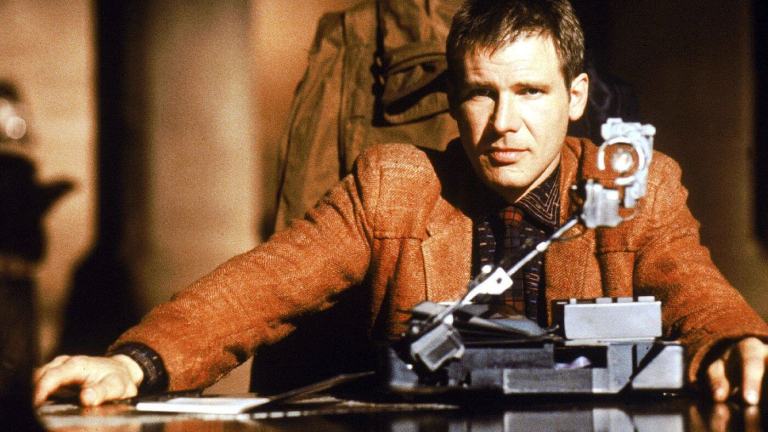Blade Runner Became a Sci-fi Classic by Being a Terrible Philip K. Dick Adaptation
Without the vision of Philip K. Dick, we wouldn’t have Blade Runner. So, why is it a good thing that Ridley Scott mostly ignored the book?

The title of the 1982 film Blade Runner is taken directly from a book. Well, from two books: the 1979 novella Blade Runner (a movie) by William S. Burroughs, which, in turn, was based on the 1974 novel The Bladerunner by Alan E. Nourse. Both of those books are science fiction stories set in the near future, but have nothing to do with escaped androids. Instead, the movie’s plot is based on the 1968 novel by Philip K. Dick called Do Androids Dream of Electric Sheep? It’s tempting to say that Ridley Scott’s science fiction masterpiece took the name Blade Runner and slapped it on a Philip K. Dick story, but the truth is, Blade Runner succeeds because it’s not really an adaptation of anything.
On June 25, 1982, Blade Runner hit theaters for the first time. The reception was less-than-stellar. However, largely thanks to smart science fiction fans and an arthouse revival in the 1990s, today, Blade Runner is not only considered one of the best science fiction movies ever made but just one of the best movies ever. That said, if someone were to watch the film and then enthusiastically run to read Dick’s book, they’d almost certainly be disappointed. Not only is Deckard not referred to as a “Blade Runner” in the book but the word “Replicant” doesn’t appear once.
Instead, Deckard’s quarry in Do Androids Dream of Electric Sheep? are known as androids which are pejoratively called “Andys” by the humans. Right there, without jumping into all the other differences between the plots, you can already see why Blade Runner was wise to jettison some of its Philip K. Dick baggage. The basic nomenclature of the novel is clunky and in no way evokes the noir-cool of the film.
This isn’t to say Dick was a bad writer or that Do Androids Dream of Electric Sheep? is somehow a bad book. That’s not the case at all. Dick is far and away one of the best science fiction writers in history, and relative to TV and film, possibly the most important science fiction writer of all time. There’s a reason why there are so many adaptations of his work. Even when his world-building is contradictory or confusing, his ideas are amazing. For utterly wonderful movies like Total Recall and Minority Report, Dick’s concepts are the spark that creates great films.
But leaving aside the brilliant aesthetic of Blade Runner (admittedly, very hard to do), if you just focus on the narrative of the film, Blade Runner’s success is mostly tied to how transgressive it is relative to Dick’s novel. In Do Androids, the entire future world is enveloped by a religion called Mercerism. This is a quasi-tech-oriented religion, which encourages its disciples to engage with “empathy boxes,” gizmos that can impact their moods directly. Imagine the recent Netflix movie Spiderhead (based on a George Saunders story) and you’ll have a sense of how the mood-altering empathy boxes work. That said, you’ll also have to combine that mood-altering feeling with virtual reality, similar to that of The Matrix or The Lawnmower Man, only totally depressing. Funnily enough, all of these things — Mercerism, empath boxes, and a virtual reality religion — are simply the trappings of Dick’s novel. Although they impact the world-building, none of this stuff actually has anything to do with Deckard hunting down Replicants Andys.
On top of all of this, in the novel, Rachael is very much not Deckard’s one true love. Yes, they have a relationship, but Rachael is essentially one of the villains of the book, trying to stop Deckard from doing his job. She also kills his pet goat, mostly because she’s really mean. Now, it’s possible a scene where Sean Young’s Racheal takes a villainous turn could have brought down the house in Blade Runner, but doesn’t it seem better the way it is?
There are countless other examples of the differences between the novel and the film. Creating a laundry list of those things isn’t the point here. More broadly, the actual story of Blade Runner and its characters have almost nothing to do with the way the book will make you feel. It’s a decent science fiction novel, but among Dick’s other brilliant books — like Ubik or Flow My Tears, the Policeman Said — it’s hard to make a case that Do Androids Dream of Electric Sheep? is truly one of his better books. What makes Blade Runner so great is that it actually rejects the pseudo-nihilism of the novel in favor of a slightly more romantic story.
I know, hold your robot horses! How can we call Blade Runner romantic? Well, by ditching the novel’s darkness and cynicism, Blade Runner is practically a rom-com. Whereas Dick’s book presents a series of dead-ends for Deckard, the movie provides him with an open door. Whether or not we prefer the studio-mandated “happy ending” of Blade Runner — in which Rachael and Deckard ride out into the countryside — or the “real ending” in which they simply get into an elevator and leave, both endings have one thing the book lacks. Hope.
Blade Runner is a dark science fiction film that’s hiding so much more underneath the surface. The beauty of Blade Runner is like light peeking through dark clouds. You can barely see it, but because it’s obscured, it’s all the more beautiful. Do Androids Dream of Electric Sheep? is just cloudy. It’s not wrong or bad. It’s just that the ending of the book will make you sad. The ending —and entire story — of Blade Runner does the opposite. It makes you feel alive.
